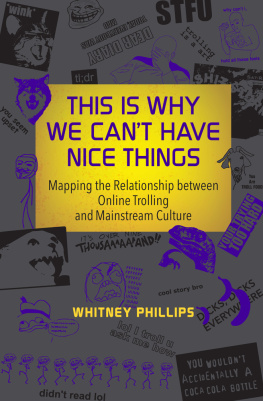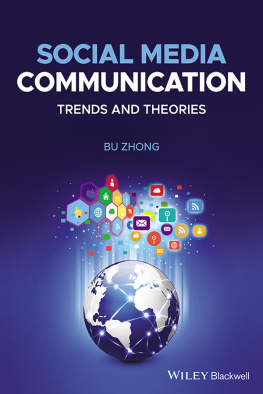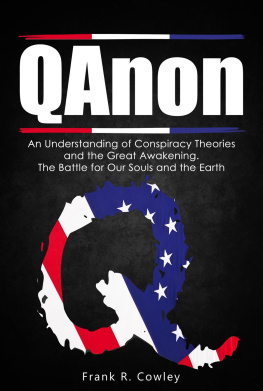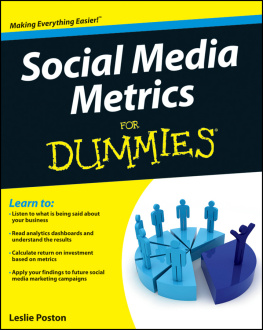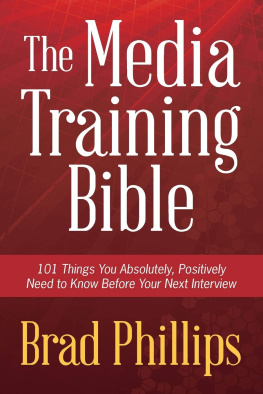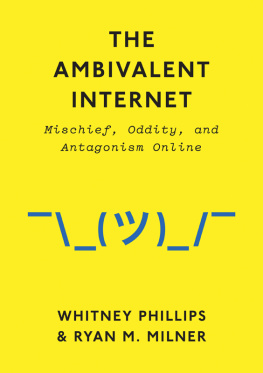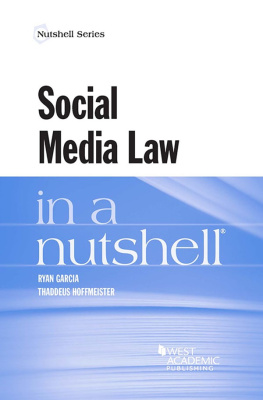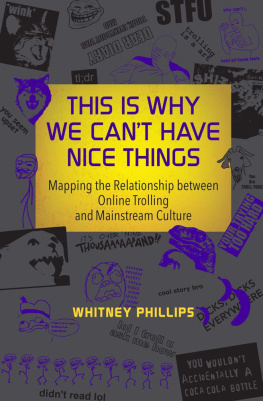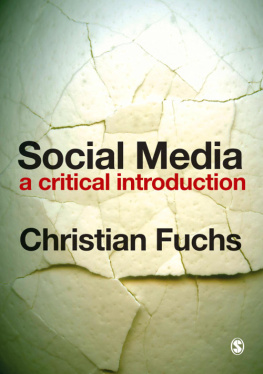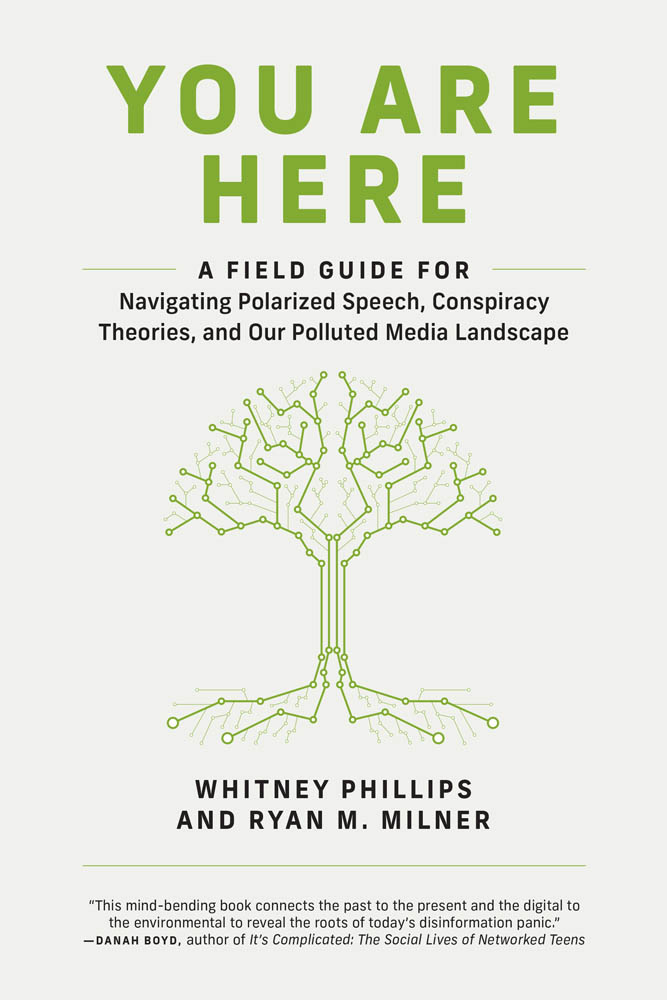
You Are Here
You Are Here
A Field Guide for Navigating Polarized Speech, Conspiracy Theories, and Our Polluted Media Landscape
Whitney Phillips and Ryan M. Milner
The MIT Press
Cambridge, Massachusetts
London, England
2021 Massachusetts Institute of Technology
All rights reserved. No part of this book may be reproduced in any form by any electronic or mechanical means (including photocopying, recording, or information storage and retrieval) without permission in writing from the publisher.
Library of Congress Cataloging-in-Publication Data
Names: Phillips, Whitney, 1983 author. | Milner, Ryan M., author.
Title: You are here : a field guide for navigating polarized speech, conspiracy theories, and our polluted media landscape / Whitney Phillips and Ryan M. Milner.
Description: Cambridge, Massachusetts : The MIT Press, 2021. | Includes bibliographical references and index.
Identifiers: LCCN 2020007621 | ISBN 9780262539913 (paperback)
Subjects: LCSH: InternetMoral and ethical aspects. | Social mediaMoral and ethical aspects. | Fake news. | Disinformation. | Propaganda. | Media literacy.
Classification: LCC TK5105.878 .P45 2021 | DDC 302.23/1dc23
LC record available at https://lccn.loc.gov/2020007621
10 9 8 7 6 5 4 3 2 1
d_r0
To the forests of Humboldt
the skies of Los Angeles
the trails of Park City
the prairies of Kansas
the rivers of Missouri
the hills of North Georgia
the marshes of Charleston
the sunsets of Syracuse
Contents
Four years ago almost to the day, we made frantic post-election additions to our last book, The Ambivalent Internet. It was too late in the production process for any substantial changes, but the press did allow us to add a gobsmacked footnote about, we couldnt believe we were typing it, President-elect Donald J. Trump. From the moment we wrote that footnote to the moment we drafted the preface to this book (over Zoom), crisis after crisis has underscored the ever-increasing stakes of the present political moment.
Phillips was confronted by these stakescertainly not for the first time, but with a different kind of urgencyin Hamburg, Germany, where she was speaking at a 2019 symposium on journalism and public discourse. Her last night in town, she went out with two other attendees, both thirty-something progressive Germans, who asked her an unexpected but poignant question: when did the United States become the United States? Phillips cocked her head. You mean like the American Revolution? No, they explained. For them, they didnt think of Germany as Germanynot in the way theyve come to understand ituntil its postWorld War II reckoning. Their question was, when did that happen in the US? Phillips thought about it. The US certainly had its share of critical historical moments. But none of them struck her as defining, exactly, because so many of the underlying issuesparticularly around social justiceremained unresolved. Then it hit her. Thats whats happening right now, she heard herself say. Thats what 2020 is about.
The period between the 2016 election and the 2020 election was chaos, and that chaos accelerated as we began final edits on You Are Here in early 2020. Things got even worseand made questions about the character of the United States even more poignantafter we submitted the manuscript to the press in April. And now, here we sit the day after voting ended, waiting for election results.
During the past eight (quarantined, infuriating, exhausting) months, the concepts and crises most prominent in the book have expanded predictably and veered out unexpectedly. A few of them roared straight to the center of election season. QAnon, the far-right conspiracy theory megaplex, generated even more nebulous iterations, roped in even more people (including at least one future congressperson), and prompted Trump to find increasingly creative ways to promote the Satanic pedophile elements of the theory without explicitly sanctioning them (though he did come close). The COVID-19 pandemicwhich we integrated into our March edits as pandemic conspiracy theories collided with QAnon conspiracy theoriesalso intensified. The death toll kept climbing, forcing us to make grim edit after grim edit as we wrote. It reached 35,000 by our final draft. Since then, 200,000 more people have died in the United States alone.
As it worsened, the COVID crisis affirmed the moral center of this book: me-first individualism is deadly and dangerous to democracy. This myopia animated the MAGA Rights rejection of mask wearing, twisting a commonsense public health measure into an infringement on individual choice and personal freedoms. The politicization of mask wearing was just one source of COVID information pollution; more spread as Trump, Republican politicians, and the MAGA media orbit vacillated between acknowledging the crisis, minimizing the crisis, and blaming Democrats for the crisis. The death toll kept ticking up. And then Trump got COVID. During his three-day hospitalization in October 2020, he received aggressive experimental treatment, recovered, then pointed to his recovery as proof that COVID wasnt a problem. He even sneered, during one of his mostly maskless, socially undistanced campaign rallies, that Joe Biden would listen to the scientists if elected. (Bidens tweeted response:... Yes.)
Against the backdrop of COVID-19, the country was also rocked by massive anti-racist protests, galvanized by the murders of George Floyd and Breonna Taylor and near-fatal shooting of Jacob Blake by law enforcementthe latest in a line of systemic police brutality against Black people. These protests and the far-right counterprotests they inspired illustrate how peoples deep memetic frames, drivers of belief and identity explored throughout the book, influence not just what people see in the world, but what theyre inclined to do in response. The Democratic National Convention and Republican National Convention exemplified the stark differences between competing frames. At the DNC, speakers drew parallels between the Black Lives Matter movement and the Civil Rights movement. Meanwhile, the RNC gave a prime-time speaking slot to a white couple from Saint Louis, Missouri, who pointed guns at Black Lives Matter protesters marching past their house.
And then there was the 2020 election itself, which was a category 5 hurricane of grassroots disinformation campaigns, mass media amplification decisions, and social media moderation policies. Some of the news was encouraging. For instance, while right-wing media outlets continued blasting pro-Trump disinformation, many center-left outlets did their best to avoid oxygenating outright falsehoods. The press wasnt perfect; some outlets continued normalizing and both-sidesing the Trump administrations worst abuses. Still, overall, 2020 election coverage was bettermore responsible, more contextualized, more patientthan 2016 election coverage. Similarly, under immense pressure not to repeat the mistakes of 2016, Twitter made a number of strong decisions about moderating election misinformation, particularly when the falsehoods were promoted by the president. Facebook made similar decisions, but ended up equivocating or backpedaling at crucial moments.
As election results trickled in, Donald Trump unsurprisingly blamed the Democrats for mail-in voter fraud. The fake news media was of course against him too, even Fox News, which provoked Trumps wrath by calling Arizona early for Joe Biden. And Twitter was flagging his lies about the voting process just to be unfair. None of these were actual conspiracies against him, but Trump made clear that his victimhood was why the Republicans had needed to fill Ruth Bader Ginsbergs vacant Supreme Court seat ASAP. The sheer number of people who emphatically supported Trump despite these falsehoods, or perhaps because of these falsehoods, further highlights the power of deep memetic frames, and what happens when those frames say: dont trust liberal institutions, dont listen to their debunks, their facts are a personal attack against you.
Next page

